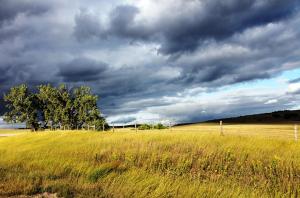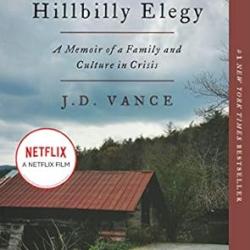Though I no longer live in Wyoming, I grew up there and get back whenever I have the chance. Gretel Ehrlich went the other direction, growing up in, well, not Wyoming. Does it really matter where? Probably a city, and probably on one of the coasts–where everything is paved over and packed in close by concrete and steel, where people are packed on top of each other like Lincoln Logs.

Originally sent to Wyoming on assignment for PBS, personal tragedy led Ehrlich to return and eventually move (immigrate?) there permanently. Her brief stint there filming a documentary on sheepherding had introduced her to the people and the lifestyle of Northwestern Wyoming, and she returned there and took up the life of a ranch hand/sheepherder (the book is a bit unclear on that, but she seems to have done a bit of everything). Eventually one result was her book of essays The Solace of Open Spaces.
If you are new to Wyoming or Western literature in general, realize that this book has some strengths and weaknesses. On the one hand, it does a masterful job of describing the setting of the West. That the land is simultaneous cruel and beautiful comes across clearly and with a good deal of (and possibly too much of) elegance. Hard work as a bulwark against the harshness of the landscape is a constant theme and reality of the place. As far as that goes, she is right on the money. Likewise she does an excellent job capturing some of the complexities of the people of the West. With a couple of exceptions (particularly involving her activities in Southern Montana), she gets the hard working cowboys and sheepherders (not ‘shepherds’) right as well.
And yet, I still maintain this isn’t exactly a ‘Western’ or ‘Wyoming’ book. Consider the introduction to the essay ‘The Smooth Skull of Winter’
“Winter looks like a fictional place, an elaborate simplicity, an Nabokovian invention of rarefied detail. Winds howl all night and day, pushing litters of storm fronts from the Beartooth to the Big Horn Mountains. When it lets up, the mountains disappear. The hayfield that runs east from my house ends in a curl of clouds that have fallen like sails luffing from sky to ground. Snow returns across the field to me, and the cows, dusted with white, look like snowcapped continents drifting.
The poet Seamus Heaney said that landscape is sacramental, to be read as text. Earth is instinct: perfect, irrational, semiotic.” (pg 71)
As Ehrlich herself points out, nobody in Wyoming talks like this. The people of the West are restrained and laconic–a word along with ‘semiotic,’ ‘luffing,’ or ‘Nabokovian’ that I would never use in Wyoming. Not because the people there are dumb, but because doing so would be seen as an affectation, or a putting on of airs–highfalutin airs at that. So again, don’t let this book be your primary guide to the West.
With that said, the main point of the book is the one that will most interest the Christian reader. Is there in fact ‘solace’ in open spaces?

I think that depends quite a bit on the nature of ‘solace’ you’re looking for. In one sense, absolutely. Open spaces are a wonderful common grace gift that a la Psalm 19. I have no doubt that escaping from the city and getting into the countryside can be a balm for psychological or emotional trauma. Though I suppose it should be mentioned that Ehrlich is not merely in Wyoming, she is working there–and working quite hard. So maybe it’s more accurate to say that the kind of solace that open spaces can offer is not freely-given, but is rather earned through time and sweat.
And yet if what you’re looking for is something deeper–if you’re looking for a true ‘solace’ and a ‘peace that passes all understanding,’ that can be found no more in ‘open spaces’ than it can in the most crowded cities on the planet. That peace can only be found in God’s Word and through faith in Jesus Christ. So go West, enjoy the open spaces; or stay home and enjoy what urban life has to offer. Both have their place and both are common grace gifts of God to soften the harshness of a fallen world. And yet both are ultimately insufficient, and you’ll only do yourself harm if you try to treat them as if they were all you need.
Dr. Coyle Neal is co-host of the City of Man Podcast and an Assistant Professor of Political Science at Southwest Baptist University in Bolivar, MO, where the spaces are still semi-open.













